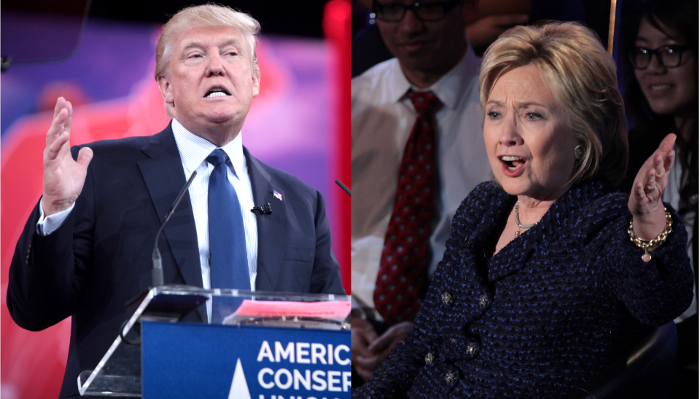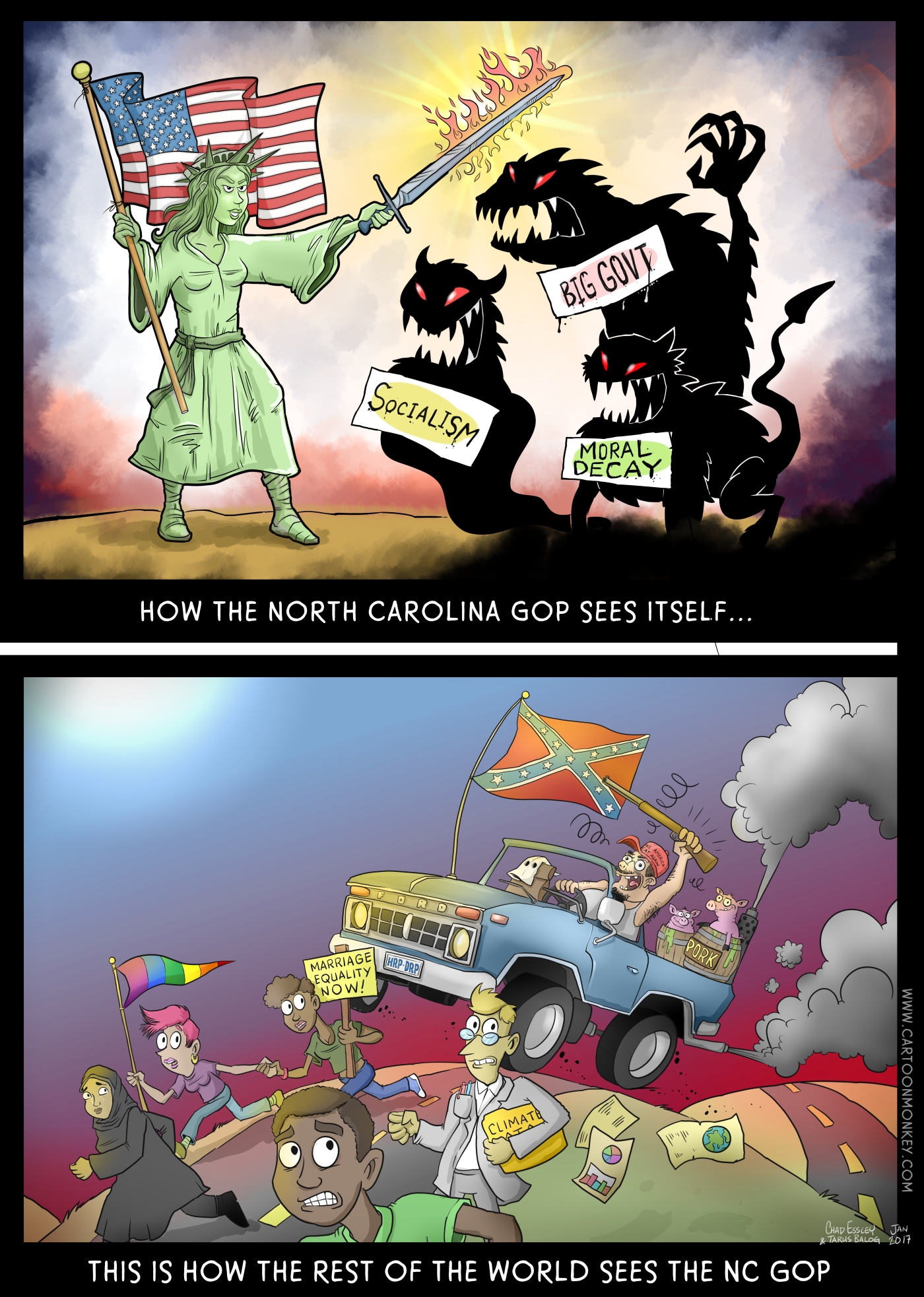I wanted to put down some thoughts about the upcoming US Presidential election, mostly inspired by Scott Adams’s blog.
Scott Adams is the creator of Dilbert, and while I like that comic and read it every chance I get, I don’t go out of my way to find it. I do, however, try never to miss a blog post or a book. Since late last summer he has been providing some interesting insights into the Trump campaign, and since he has also made me painfully aware of my own confirmation bias, I try very hard to read anything he writes with an open mind.
Unlike Trump, I am not a master of social networks. I don’t even have a Facebook account, and most of my thoughts take more than 140 characters to express. So what follows will seem to be, for most, needlessly tedious.
First, a little political background. I self-identify as a left-leaning libertarian (small “L”), although there really doesn’t exist a political party that matches my beliefs. I was trained as a scientist and tend to view the Scientific Method as one of the best ways to understand the world. I hold individual freedoms to be paramount in any society, but I also believe that as a society it benefits us to provide basic services to all citizens (unlike most large “L” Libertarians). The only political party I’ve ever belonged to was the Republican party, but I left it long ago when they started trying to legislate morality.
How do I apply science to social issues? Well, for one example let’s look at North Carolina’s controversial HB2 law concerning transgender bathroom use. I am against it for a number of reasons, but mainly because it makes it illegal to pursue discrimination cases in State court and removes a lot of power from municipalities. I like having different cities and towns try things because it allows for experimentation and testing.
But to get back to the “potty police”, the fear that most of the sponsors of the bill prey on is that without it bathrooms would become less “safe” and sexual predators would use it to scout for victims. That doesn’t sound likely to me, but let’s take that as our hypothesis: allowing people to use any bathroom they chose results in more sex crime.
Next, we’d need an experiment. Well, how about we take Washington, DC, our nation’s capital, and allow people to use the restroom of their sexual identity. What would happen?
Well, they did that in 2006, and nothing bad happened. Now a sample size of one doesn’t give us much to go on, but it is better than a sample size of zero. What should have happened in North Carolina is that the government should have let Charlotte proceed with their plan and then examined the results. If sex crimes increased, then it should be reexamined. If not, then the original DC experiment would have been confirmed.
Of course that didn’t happen, but science is rarely used in politics. It also often isn’t simple. Take the legalization of marijuana in Colorado. By some measures crime is up, and it also appears that more people involved in fatal car crashes have used marijuana. The studies don’t claim causality, for those involved in the car crashes we don’t know if they were high at the time, but we now have some data which can help us decide if this was a good thing for society.
Most important issues like this are complex. The results are nuanced and it is often hard determine which decisions will result in the betterment of society as a whole. What I look for in a President is someone who can grasp complex issues and has the ability to understand nuance and act with subtlety.

Which brings me back to this election. It is hard for me to believe that out of nearly 320 million people in this country, the two best people to run it are Donald Trump and Hillary Clinton. I think it is a choice between Satan and Beelzebub, and I’ll let you decide which is which. The system is broken, and I’m not sure how to fix it (I have some ideas but by this point I’m certain to have lost two of my three readers, so I won’t dwell on it).
Usually I vote third party. Last election I voted for Gary Johnson, and I am considering it again. In 2012 I saw little difference between Mitt Romney and Barack Obama, but I have some misgivings about a Trump presidency, more so than I would a Clinton presidency.
Let me state that I don’t like Donald Trump, or at least the public figure (I’ve never met the man). I find him tacky and boorish. But there are some aspects of him I like more than, say, Ted Cruz.
I also don’t care for Hillary Clinton. She got the nomination based less on ability and more on paying her dues. Look, this country was founded to avoid royalty yet there is the potential for four of the last five presidents to come from just two families.
But when it comes to understanding complexity, nuance and subtlety, I think Clinton has the edge.
In today’s blog post, Adams takes on four objections a “Trump Hater” would have and makes an attempt to persuade you to think differently. Let’s check them out.
Trump is a loose cannon who might offend other countries and maybe even start a nuclear war.
I think Trump’s persuasion strengths could be very powerful in a President – as long as they were used for “good”. I’m not certain that would be the case as Trump has given little evidence about what he’d actually do as President with the exception of building a wall (which would be expensive and ineffective, outside of being used a symbol). But I wonder how well his persuasion techniques would work outside of the US?
What I am curious about is China. Adams writes “Trump has five decades of acting rational in business dealings, and getting along with people all over the world, including China and Russia.” Adams points out that Trump is on good terms with Vladimir Putin. That seems right – they have similar styles – although I don’t think lives of average Russians have improved under Putin’s leadership. But I couldn’t really find a reference about Trump dealing with China.
The Chinese have this concept of “Face“. While Trump is an excellent negotiator, can he win a negotiation while letting his opponent seem to win as well? The same issue is present in Arab culture. Trump likes to devastate his opponents and stand over their bleeding bodies. China holds so much US debt that they could cripple our economy any time they wanted just by dumping it at pennies on the dollar. They are huge pragmatists so I doubt they will do it, as it would affect their economy in a negative way as well, but could Trump put them in a situation where they had to in order to save Face?
Trump is terrible at business because he has several bankruptcies.
This is a straw man of sorts. There are a number of different types of bankruptcy, and they are not always “bad”. If you fly via commercial airlines you are probably putting your life in the hands of a company that, at one time, declared bankruptcy. As Adams points out, Trump owns hundreds of businesses, so he’s actually been more successful than most if you consider the scale.
The straw man is that Adams implies that if you can explain away the bankruptcies, that makes Trump good at business. The problem is that Trump isn’t very good at business. Forbes estimated in 1982 that Trump had between $200 million and $500 million in assets. If he is now worth $10 billion, like he claims, that means he did worse that if he had taken his money and placed it in an unmanaged index fund. Since the index fund represents the aggregate performance of business in this country, it means that Trump is worse that the average person at business.
Another issue to think about is that if Trump’s main experience is in the world of business and not the world of politics, his aversion to risk may be less than optimal. Take the “start a nuclear war” comment above. You can’t create a situation that leads to say, a war, and then just declare bankruptcy and start over if it doesn’t work out. Now Trump has never, to my knowledge, exhibited a pro-war hawkish stance, but being used to mitigating risk using bankruptcy doesn’t work in the arena of international politics.
Trump is a racist.
Adams likes to point out that Trump doesn’t say anything blatantly racist. For example, his prejudices against Muslims targets a religion and not a race, and that he referred to that judge as being “Mexican”, which is a nationality, not because he is Latino.
This is splitting hairs. I live in the southern United States and the racists I come across wouldn’t know the difference between a Mexican, a Puerto Rican or a Nicaraguan. To them, all Latinos are “Mexicans”. It’s like saying “I hate Africans, but I’m not racist because Africa is a continent and not a race”.
Adams makes another statement that “Islam is unique among religions in that it includes an order from God that Muslims should overthrow any government that is not compatible with Islam.” I couldn’t find that in the Qur’an, although there are a number of passages that could be interpreted that way, but the same issues exist with the Bible. Most Christians, especially fundamentalists, hold God’s law above the law of any land. In North Carolina you can be a government official and keep your job even if you refuse to obey the law and, say, issue a marriage license to a same-sex couple.
The same thing was said about Catholics when John F. Kennedy was running for President. Would he listen to the Constitution or the Pope? I don’t think Islam is that much different.
For full disclosure I’ve been to both Syria and the UAE and both times almost died – from being entertained to death. For the most part the Islamic culture imposes a requirement of hospitality far beyond other cultures, at least in my personal experience.
The problem with Trump is that he is willing to prey on fears about people who are “different” if it suits him. That, in a nutshell, is racism.
Trump is anti-women and anti-LGBT
I’ll agree that this is not a valid objection. While it is impossible for Trump to be more “pro-woman” than Hillary short of a sex change (maybe that can be Trump’s third act) he hasn’t exhibited much that makes me think he hates women or people of a particular sexual persuasion. He has powerful women in his life and his business ventures, and before the election seemed to leave subjects such as abortion up to women.
Sure, he makes offensive comments about women and their menstrual cycles, and he also makes fun of reporters with disabilities, etc., but that is simply to promote his agenda. The question you have to ask is if that works well for a President. I had this vision of Trump at a State dinner with the Chinese delegation where he stuck two sugar cubes on his front teeth, squinted his eyes and spoke in a pastiche Chinese accent as a joke. I don’t think anyone laughed.
I am not sure how I will vote in November. I mostly likely will support Johnson again, since I’m in it for the long game and the only way to fix the broken “one party” system is to have a lot more political parties and the Libertarian party seems closest to break that 5% barrier. I don’t want to see Trump as President if for any other reason than I don’t like the message that sends the rest of the world.
I’ll end with a little story. I was doing some work in England, and after a few days had become friends with the client. He had never been to the United States, and as we were walking to lunch he sheepishly asked “I would like to know, are all Americans … loud?”
I had to laugh and explain that I was louder than most, but in an increasingly “flat” world it is imperative that we learn to get along together and to understand one another. Building more walls is not the solution.





